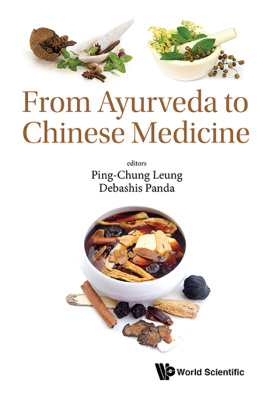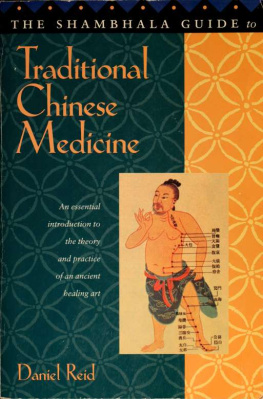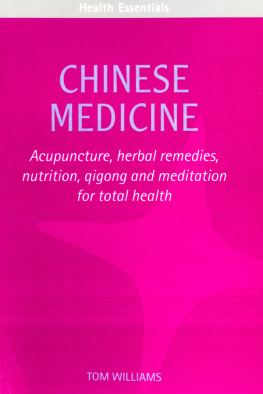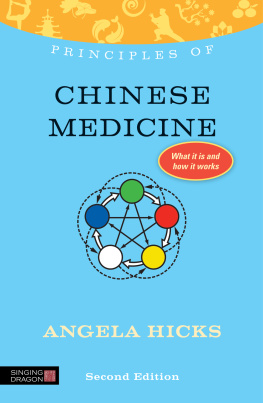A Comprehensive Guide to Chinese Medicine
Second Edition
A Comprehensive Guide to Chinese Medicine
Second Edition
edited by
Ping-Chung Leung
The Chinese University of Hong Kong, China

Published by
World Scientific Publishing Co. Pte. Ltd.
5 Toh Tuck Link, Singapore 596224
USA office: 27 Warren Street, Suite 401-402, Hackensack, NJ 07601
UK office: 57 Shelton Street, Covent Garden, London WC2H 9HE
Library of Congress Cataloging-in-Publication Data
A comprehensive guide to Chinese medicine / edited by Ping-Chung Leung. -- Second edition.
p. ; cm.
Includes bibliographical references and index.
ISBN 978-9814667074 (hardcover : alk. paper)
I. Leung, Ping-Chung, 1941 , editor.
[DNLM: 1. Medicine, Chinese Traditional. 2. Drugs, Chinese Herbal. WB 55.C4]
R601
610.951--dc23
2015001995
British Library Cataloguing-in-Publication Data
A catalogue record for this book is available from the British Library.
Copyright 2016 by World Scientific Publishing Co. Pte. Ltd.
All rights reserved. This book, or parts thereof, may not be reproduced in any form or by any means, electronic or mechanical, including photocopying, recording or any information storage and retrieval system now known or to be invented, without written permission from the publisher.
For photocopying of material in this volume, please pay a copying fee through the Copyright Clearance Center, Inc., 222 Rosewood Drive, Danvers, MA 01923, USA. In this case permission to photocopy is not required from the publisher.
Typeset by Stallion Press
Email:
Printed in Singapore
Contents
Charlie Changli Xue & Kylie A. OBrien
Kylie A. OBrien & Charlie Changli Xue
Chun Guang Li & Charlie Changli Xue
to Biological Activities
Johnny Chi-Man Koon, Judy Yuet-Wa Chan,
Virginia Kit-Man Lau, Erik Chun-Hay Ko,
Grace Gar-Lee Yue, Clara Bik-San Lau &
Ping-Chung Leung
Ping-Chung Leung, William King-Fai Cheng &
Carmen Yuet-Shim Fong
Baoyu Xin & Zhen Zheng
Ping-Chung Leung
Qunhao Zhang & Ping-Chung Leung
Yung-Chi Cheng & Daniel Man-Yuen Sze
Ping-Chung Leung
Ping-Chung Leung
Ting Hor
Ping-Chung Leung
Contributors
Judy Yuet Wa Chan
Department of Biochemistry
Faculty of Medicine
The Chinese University of Hong Kong
Hong Kong
King-Fai Cheng
The Institute of Chinese Medicine
The Chinese University of Hong Kong
Hong Kong
Yung-Chi Cheng
Department of Pharmacology
Yale School of Medicine
Yale University
USA
Yuet-Shin Fong
The Institute of Chinese Medicine
The Chinese University of Hong Kong
Hong Kong
Ting Hor
Anthropologist
11, Clos Dsir I
91120 Palaiseau
France
Pak Kwan Hui
Department of Pathology
Kwong Wah Hospital
Hong Kong
Chun-Hay Ko
The Institute of Chinese Medicine
The Chinese University of Hong Kong
Hong Kong
Johnny Chi Man Koon
The Institute of Chinese Medicine
The Chinese University of Hong Kong
Hong Kong
Bik-San Lau
The Institute of Chinese Medicine
The Chinese University of
Hong Kong
Hong Kong
Kit Man Lau
Department of Biochemistry
Faculty of Medicine
The Chinese University of Hong Kong
Hong Kong
Simon Ming Yuen Lee
The Institute of Chinese Medicine
The Chinese University of Hong Kong
Hong Kong
Ping-Chung Leung
The Institute of Chinese Medicine
The Chinese University of Hong Kong
Hong Kong
Chun Guang Li
National Institute of
Complementary Medicine
University of Western Sydney
Locked Bag 1797, Penrith NSW
2751
Australia
Kylie A. OBrien
Department of Medicine
Monash University
Australia
Man-Yuen Sze
School of Medical Sciences
RMIT University
Melbourne, Australia
Baoyu Xin
The Institute of Chinese Medicine
The Chinese University of Hong Kong
Hong Kong
Charlie Changli Xue
School of Health Sciences
RMIT University
Bundoora, Vic 3083
Australia
Gar-Lee Yue
The Institute of Chinese Medicine
The Chinese University of Hong Kong
Hong Kong
Qunhao Zhang
Massachusetts General Hospital
Harvard Medical School
USA
Zhen Zheng
The RMIT Chinese Medicine
Research Group
RMIT University
Australia
Foreword
This book of essays seeks to assess the place of traditional Chinese medicine (TCM) in the context of the immense advances in scientific medicine. It meets a growing need, as many Chinese observe with keen interest, the advances in TCM methodologies but wonder how scientific they really are. This is particularly true of people who long for a health and wellness approach towards illness in place of one that puts the emphasis on being curative in more invasive ways. Most Chinese have an ambivalence about TCM that can be traced back to the 19th century when Western hospitals were introduced into China and the European colonies. Some Chinese were quick to see their advantages, while others were gradually persuaded that Western methods work better for some kinds of illness. Increasingly, most Chinese realised that doctors who were professionally trained would make more reliable physicians. So much so that TCM practitioners have themselves sought to make their heritage more scientific in order to gain back their credibility. This volume of essays should go a long way towards detailing the valuable relationship between TCM and modern medicine in recent decades.
I recall, when still in high school, I heard that two out of the first three Chinese Queens scholars from Malaya in the 19th century chose to study medicine in British universities. They were Lim Boon Keng (Lin Wenqing) and Ng Lean Tuck (Wu Liande). I later discovered that this story was similar to the one in Hong Kong where students like Ho Kai (He Qi) not only had a brilliant academic record, but was also one of the founders of the first modern medical college in Hong Kong in 1887. The college produced Sun Yat-sen, one of the first two graduates in Western medicine on Chinese soil, who was to provide a modern world view that changed the course of Chinese history. The college later became the forerunner of the Faculty of Medicine, University of Hong Kong, now one of the most prestigious medical schools in Asia. Elsewhere too, medical colleges seem to be the first European institutions that Asians everywhere wanted for their children.
Another story reflecting an ongoing ambivalence comes to mind. The famous philanthropist, Tan Kah Kee (18741960) wrote in his memoirs how he tried in the 1890s to print copies of the best available TCM prescriptions for distribution among the poor in the villages in China. Decades later, in the 1940s, he remembered with regret how he had failed in his efforts. This was despite his own conversion to the efficacy of Western medicine and his fervent wish for Lim Boon Keng, the graduate of the University of Edinburgh whom he had invited to be the president of Xiamen University, to establish a medical school there during the 1920s. Tan Kah Kees attitude reflects well a similar deepseated ambivalence that survives till the present day.
In 1965, while in Kuala Lumpur, I was invited to sit on the Commission of Traditional Medicine. This led me to read more about the subject, and of particular interest was the work of two modern doctors that brought TCM and scientific medicine together in a book entitled







